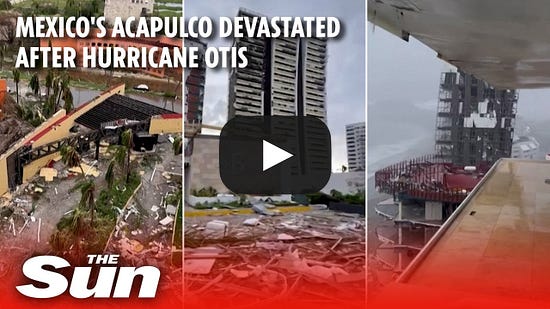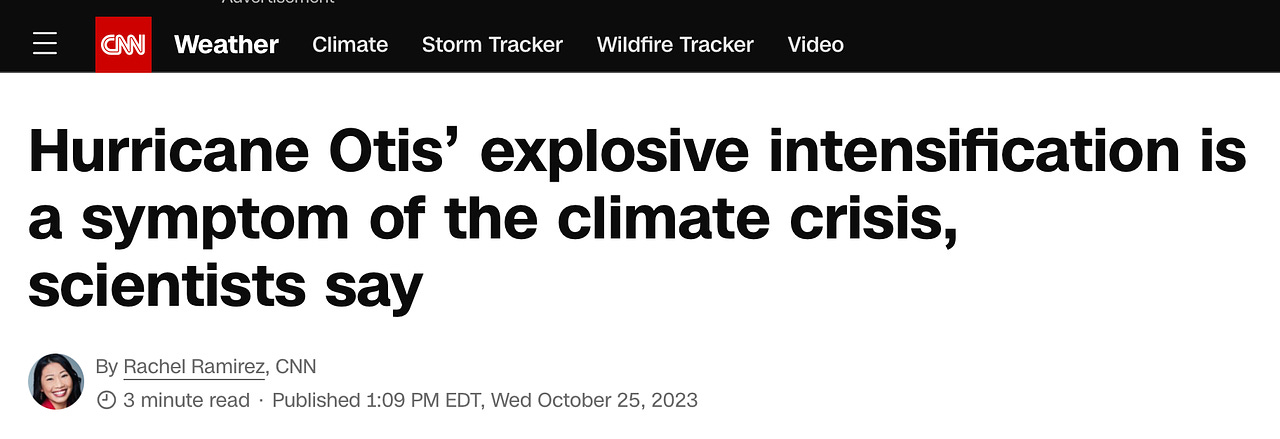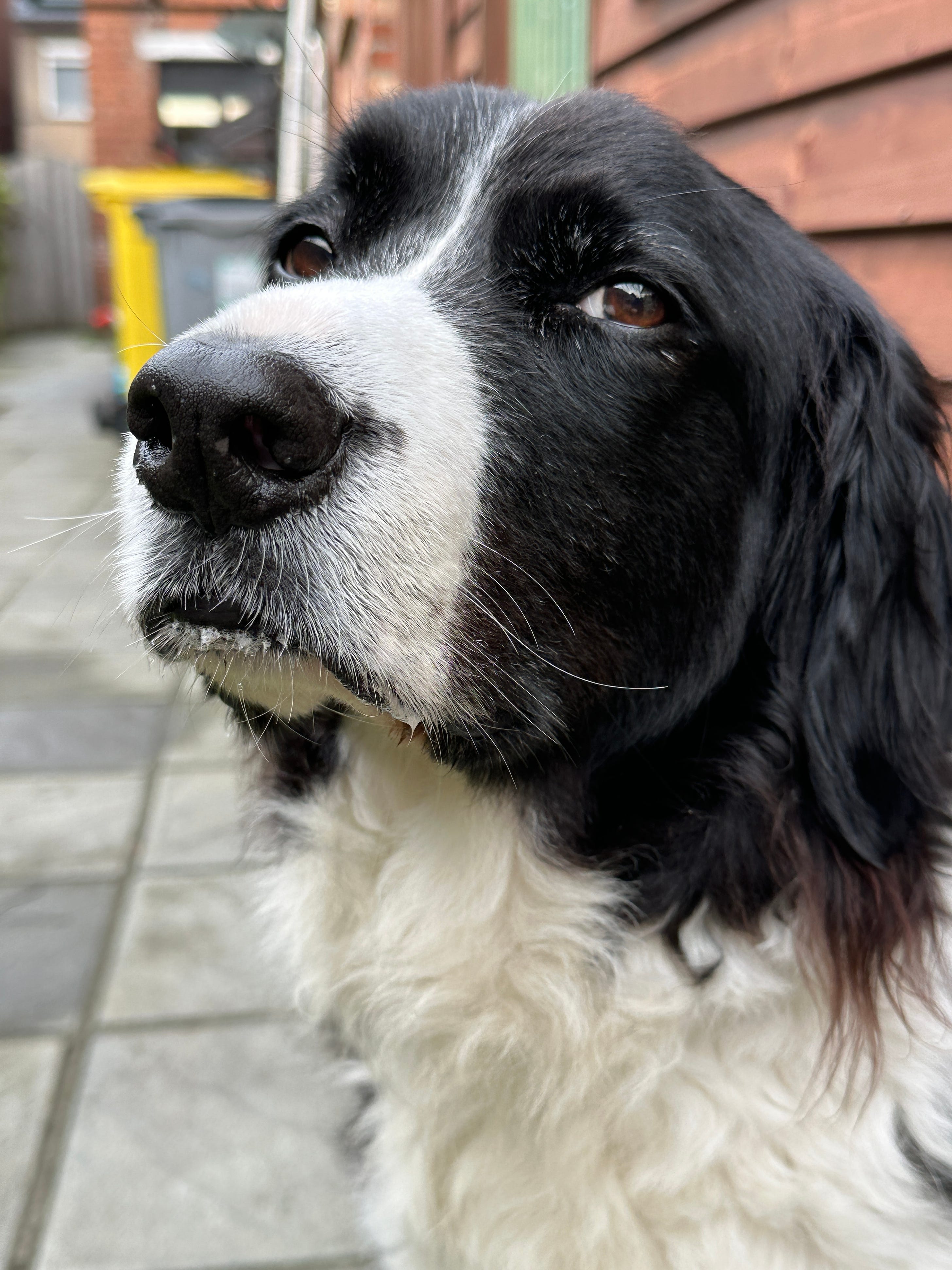Calling this "climate change" is not enough
Welcome back to HEATED—Emily here with a few thoughts on Hurricane Otis and its “explosive intensification,” which is a phenomenon we can expert more of as we continue to burn fossil fuels. You can also find some Hurricane relief resources at the bottom of this newsletter. Calling this "climate change" is not enoughJournalists and meteorologists must go further, and call rapid hurricane intensification a symptom of fossil fuels.
A monster Category 5 hurricane pummeled the southern Mexican state of Guerrero on Wednesday, killing at least 27 people, knocking out power, and destroying infrastructure in the famed city of Acapulco. If you’re surprised to hear about this, that may be because weather forecasters were, too. On Tuesday night, Hurricane Otis “experienced nearly unprecedented explosive development in hours, going from a Category 1 to a catastrophic Category 5 with nearly no warning, stunning residents and meteorologists alike,” Fox Weather reported.  The technical term for when hurricanes gain strength very quickly is “rapid intensification,” and the phenomenon is becoming more common as the planet warms. That’s because greenhouse gas emissions from fossil fuel burning, deforestation and industrial agriculture are making the ocean much hotter—and hotter oceans make rapid intensification more likely. And while scientists cannot say to what degree climate change played a role in Hurricane Otis’s explosive intensification specifically (at least not without an attribution study, which can take months) they are confident in saying that such intensification is an expected symptom of climate change, and thus humanity’s ever-increasing burning of fossil fuels. “All of this is just confirming what we expected,” Suzana Camargo, a hurricane expert and professor at Columbia University’s Lamont-Doherty Earth Observatory, told CNN on Wednesday. Not just a climate change symptom — a pollution symptom
If you’re a longtime reader, you’ve heard a version of this before, so I apologize for feeding a fed horse. I can understand, to a degree, why it’s not really happening. For years, there’s been a concerted effort among climate activists and climate journalists to get mainstream media to simply mention “climate change” in their coverage of extreme weather disasters. And this push has not really focused on getting news outlets to mention why climate change is happening. So consider this my official push for journalists and meteorologists to go one step further. When they write about disastrous weather phenomenons that are “connected to climate change,” I believe that in order to be truly responsible, they must also note the primary causes of climate change: fossil fuels, deforestation, and industrial agriculture. I have seen some new outlets already take up this practice. Reuters, for example, mentioned the primary source of carbon pollution—fossil fuels—in its climate coverage of the Maui wildfires back in August.
It may seem like a small addition with little meaning, but I don’t think it is. Because when stories about climate-fueled weather disasters don’t mention the actual causes of climate change, they wind up leaving readers and viewers with very little information about what, if anything, can actually be done to solve the problem. I believe this is a big reason why reading about climate change makes so many people feel hopeless. But on the flip side, when readers are told explicitly about the primary causes of climate change, they are given something to do with their concern. At the very least, they can walk away from coverage of worsening disasters knowing confidently what the solution involves: rapid reduction of pollution and deforestation. It’s possible that some journalists and meteorologists avoid mentioning the specific causes of climate change in disaster coverage because they believe it equates to activism. But this is not true. Telling readers the specific cause of a problem is not the same as telling readers that they should or must solve that problem. It is also not the same as telling readers who to vote for or what policies to support. Being explicit about what’s causing the climate crisis simply provides readers with the knowledge they need to make truly informed decisions. This is the primary responsibility of reporters and news outlets, which is why it continually baffles me that we see it so infrequently. It’s also why I continue to write about it despite the embarrassment of repeating myself. (Also, please don’t attack that CNN article, it is a good article. This is just something I think could really improve all climate/extreme weather coverage. Thanks!) Hurricane Otis relief resources:
Catch of the Day: Reader J would like to introduce you to Feniq, a 10-year-old rescue dog who also happens to be the best human J knows—and the most neurotic. Feniq is a cross between a border collie and a springer spaniel, maybe. Want to see your furry (or non-furry!) friend in HEATED? It might take a little while, but we WILL get to yours eventually! Just send a picture and some words to catchoftheday@heated.world.
You're currently a free subscriber to HEATED. For the full experience, upgrade your subscription. |
Older messages
How Big Beef muzzled methane research
Tuesday, October 24, 2023
A new Guardian investigation reveals the UN's farming wing downplayed livestock emissions after pressure from the meat, feed and dairy industries.
The urgent need for methane literacy
Thursday, October 19, 2023
The climate threat of methane gas expansion is growing, and the public remains largely unaware — in part because of misinformation and misleading terminology.
143 coal plants and a punch in the face
Thursday, October 19, 2023
Which do we, as a society, find more abhorrent?
Our modern-day Columbuses
Monday, October 9, 2023
Like the controversial colonizer, billionaires are trying to lead the discovery of a new world—and they're approaching it with a similarly destructive mindset.
Technically, that New York City flood was “mild”
Wednesday, October 4, 2023
If we want to understand the full picture of climate-fueled flood risk to New York City, we can't just look at rainfall.
You Might Also Like
There Is Only One Aimee Lou Wood
Monday, March 3, 2025
Today in style, self, culture, and power. The Cut March 3, 2025 ENCOUNTER There Is Only One Aimee Lou Wood A Sex Education fan favorite, she's now breaking into Hollywood on The White Lotus. Get
Kylie's Bedazzled Bra, Doja Cat's Diamond Naked Dress, & Other Oscars Looks
Monday, March 3, 2025
Plus, meet the women choosing petty revenge, your daily horoscope, and more. Mar. 3, 2025 Bustle Daily Rise Above? These Proudly Petty Women Would Rather Fight Back PAYBACK Rise Above? These Proudly
The World’s 50 Best Restaurants is launching a new list
Monday, March 3, 2025
A gunman opened fire into an NYC bar
Solidarity Or Generational Theft?
Monday, March 3, 2025
How should housing folks think about helping seniors stay in their communities? ͏ ͏ ͏ ͏ ͏ ͏ ͏ ͏ ͏ ͏ ͏ ͏ ͏ ͏ ͏ ͏ ͏ ͏ ͏ ͏ ͏ ͏ ͏ ͏ ͏ ͏ ͏ ͏ ͏ ͏ ͏ ͏ ͏ ͏ ͏ ͏ ͏ ͏ ͏ ͏ ͏ ͏ ͏ ͏ ͏ ͏ ͏ ͏ ͏ ͏ ͏ ͏ ͏ ͏ ͏ ͏ ͏ ͏ ͏ ͏ ͏
The Banality of Elon Musk
Monday, March 3, 2025
Or, the world we get when we reward thoughtlessness ͏ ͏ ͏ ͏ ͏ ͏ ͏ ͏ ͏ ͏ ͏ ͏ ͏ ͏ ͏ ͏ ͏ ͏ ͏ ͏ ͏ ͏ ͏ ͏ ͏ ͏ ͏ ͏ ͏ ͏ ͏ ͏ ͏ ͏ ͏ ͏ ͏ ͏ ͏ ͏ ͏ ͏ ͏ ͏ ͏ ͏ ͏ ͏ ͏ ͏ ͏ ͏ ͏ ͏ ͏ ͏ ͏ ͏ ͏ ͏ ͏ ͏ ͏ ͏ ͏ ͏ ͏ ͏ ͏ ͏ ͏ ͏ ͏ ͏ ͏
“In life I’m no longer capable of love,” by Diane Seuss
Monday, March 3, 2025
of that old feeling of being / in love, such a rusty / feeling, ͏ ͏ ͏ ͏ ͏ ͏ ͏ ͏ ͏ ͏ ͏ ͏ ͏ ͏ ͏ ͏ ͏ ͏ ͏ ͏ ͏ ͏ ͏ ͏ ͏ ͏ ͏ ͏ ͏ ͏ ͏ ͏ ͏ ͏ ͏
Your dishwasher isn’t a magician
Monday, March 3, 2025
— Check out what we Skimm'd for you today March 3, 2025 Subscribe Read in browser Together with brad's deals But first: 10 Amazon Prime benefits you may not know about Update location or View
My 10 year anniversary of being single: exclusive extract from my book
Monday, March 3, 2025
Single: Living a Complete Life on Your Own Terms is out now ͏ ͏ ͏ ͏ ͏ ͏ ͏ ͏ ͏ ͏ ͏ ͏ ͏ ͏ ͏ ͏ ͏ ͏ ͏ ͏ ͏ ͏ ͏ ͏ ͏ ͏ ͏ ͏ ͏ ͏ ͏ ͏ ͏ ͏ ͏ ͏ ͏ ͏ ͏ ͏ ͏ ͏ ͏ ͏ ͏ ͏ ͏ ͏ ͏ ͏ ͏ ͏ ͏ ͏ ͏ ͏ ͏ ͏ ͏ ͏ ͏ ͏ ͏ ͏ ͏ ͏ ͏ ͏ ͏ ͏ ͏
Selena Gomez Shut Down The Oscars Red Carpet In This Spectacular Gown
Monday, March 3, 2025
10/10. The Zoe Report Daily The Zoe Report 3.2.2025 Selena Gomez Shut Down The Oscars Red Carpet In A Spectacular Gown (Red Carpet) Selena Gomez Shut Down The Oscars Red Carpet In A Spectacular Gown 10
David Beckham Opens Up About Turning 50, Finally Mastering Pullups, and Feasting on Jellied Eels
Sunday, March 2, 2025
View in Browser Men's Health SHOP MVP EXCLUSIVES SUBSCRIBE THIS WEEK'S MUST-READ David Beckham Opens Up About Turning 50, Finally Mastering Pullups, and Feasting on Jellied Eels David Beckham




